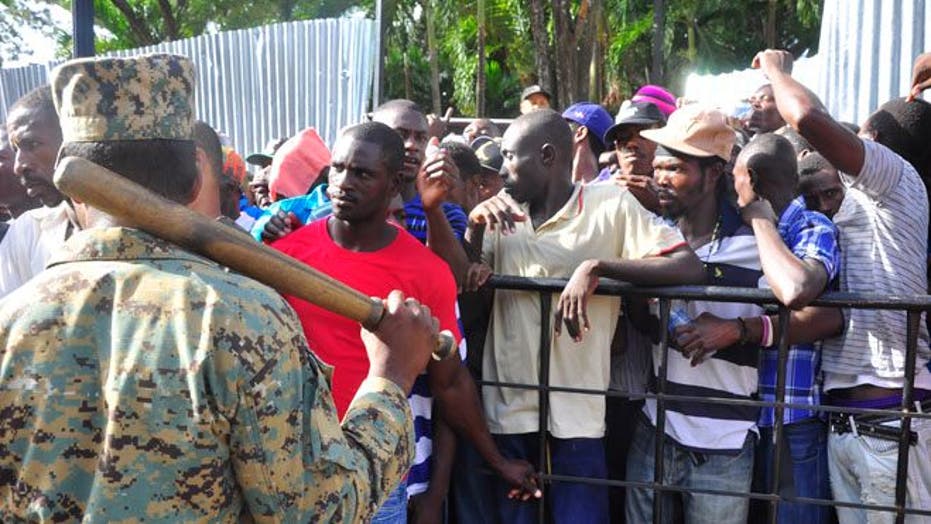Santiago de los Caballeros, Dominican Republic – Long lines, confusion and bribery marked the end of the period in the Dominican Republic in which thousands of migrants – nearly all of them of Haitian origin – sought to establish their residence in the country before a midnight Wednesday deadline.
“I’ve been sleeping out here for four days now, and I can’t get in,” Yorel Petit, a 25-year-old Haitian migrant complained to Fox News Latino.
Like other people waiting at a processing center in the northern city of Santiago de los Caballeros, the second-largest in the country after the capital of Santo Domingo, Petit complained that police officers were providing preferential treatment in exchange for bribes.
For Charles, a 27-year-old living in the D.R. since he was 7 who asked to be identified only by his first name, the idea of not being able to register in time and possibly getting deported to Haiti brought out feelings of helplessness.
“I don’t know anybody in Haiti,” he said. “If I get deported, it would be like going to a strange country with zero family … no financial support.”
- Dominican larimar miners have a dangerous job
- Sen. Menendez’s corruption trial will be held in New Jersey, judge rules
- Oscar de la Renta’s adopted son nearly snubbed in dad’s $26 million will
- Best pix of the week
- Official: Dominican Republic ready to resume deportation of those without legal residency
- Forever in style: Oscar de la Renta’s legacy honored at Cannes Film Festival
He told FNL, “I don’t know what I am going to do.”
The chaotic scene was played out across the country, which shares the island of Hispaniola with Haiti, at 36 processing centers that were established after a controversial decision to conduct an audit of the country’s citizenship registry from 1929 until 2010 – the National Plan for Regularization and Naturalization.
The law is aimed at regulating the historic flow of migrants from impoverished Haiti to the relatively wealthier D.R. The government pushed it forward last year amid international criticism of a Constitutional Court decision saying people born in the country to non-citizens did not qualify for citizenship under the constitution unless they had at least one parent who was a citizen or legal resident.
The government said about 50,000 people in this category will be granted citizenship.
The Interior Ministry has said there are about 500,000 people who could qualify for residency under the program. As of Wednesday, about 250,000 had registered, but officials said only about 10,000 have produced sufficient documentation.
With all the people turned back to get more documents and the flood of those who waited to begin the process, in recent weeks the number of applicants began to far exceed the capacity of the centers, and an already disorganized process got even worse.
One person waiting at the Santiago processing center who identified himself as Matias Louis, said that he has been trying to register for a little more than a year without any success. Like others FNL spoke to, he couldn’t get the necessary documentation from Haiti.
According to Dominican authorities, those who register successfully will receive temporary documents that allow them to remain in the D.R. for 45 days, while their cases are being evaluated.
Those who fail to register will be subject to deportation.
Secretary of the Interior José Ramón Fadul has said that the country has no plans to immediately begin mass deportations, but Associated Press journalists along the border said about 12 people were deported Wednesday, some claiming they had been in the country long enough to qualify for the registration period.
Human rights groups say they fear that officials will deport people arbitrarily if they look Haitian or speak Spanish with a Creole accent as has been done in the past.
The Santiago processing center stopped receiving applicants around 4 p.m., even though the deadline was midnight, raising the number in the crowd outside as well as their level of desperation.
One migrant named Jean Pierre told FNL, “I have been sleeping in a corner in the street for the last two days, just waiting to finally register. So far, I have not been successful.”
He hoped that Dominican President Danilo Medina would grant an extension for those still waiting outside the processing centers.
“He will do it,” he told FNL. “Many people have all the documentation required, but due to work and lack of money, left the process for the last minute.”
The Haitian government has cleared a field near the border-crossing point at Malpasse to provide assistance to people who have been deported. According to the AP, the area was deserted Wednesday except for some guards and construction crews.
The Associated Press contributed to this report.

